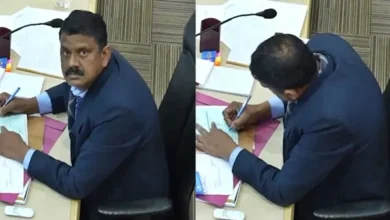Opinion | Dhankhar Mimicry Row: The Necessity of Thick Skin for Politicians
It was a great and unexpected experience for me to meet the Vice President and Chairman of the Rajya Sabha Jagdeep Dhankhar. At the time, he served as West Bengal’s governor. I was scheduled to give a speech at the esteemed Birla Academy of Art and Culture in Kolkata, which is directed by the very talented and driven Jayashree Mohta. My most recent book, “Adi Shankaracharya: Hinduism’s Greatest Thinker,” was the topic of the presentation. Jayashree contacted me a day before of the event, full of excitement, informing me that Governor Dhankhar had confirmed he would attend the presentation, but he would only be there for a short while due to other obligations.

My speech was broadcast live online on a large screen at the Birla Academy. Jayashree subsequently informed me that Dhankhar did not depart early as he had said, but instead remained for the duration of the talk, which lasted for more than an hour. She was taken aback, which made me happy, but I also regretted not having the chance to thank him in person.
After a while, he became the vice president (VP), and I was asked to an event at his house to celebrate the release of a new book on Hinduism written by Dr. Karan Singh. It was my first time meeting Dhankhar Saheb in person. But what surprised me was how warm he was. During his speech at the launch, he made several references to me and my works. Later, at the tea, we had a lengthy conversation during which he ordered his official photographer to take a picture of the two of us. He also instructed his staff to set up a follow-up meeting with me.
I bring up the aforementioned instances to demonstrate the vice president’s kindness and modesty, as well as his sharp sense of humor, quick belly laugh, and enthusiastic interest in topics beyond the purview of politicians. It was unexpected, then, that he became so offended by TMC MP Kalyan Banerjee’s parody of him, seeing it as a disrespect to his lofty constitutional position.
Instead of imitating Dhankhar on the House floor, where it would have been disrespectful to the Chair and offensive, Banerjee performed the imitation outdoors, where members of Parliament suspended from both Houses had assembled in protest. On one hand, it is understandable that the Speaker and the VP—as the Rajya Sabha’s chairs—are trying to put a halt to the loud vandalism that has become the norm in our legislature. On the other hand, there is an established custom that the Treasury benches bear the primary duty for managing the House.
It was not unreasonable to expel so many MPs in bulk for demanding that Home Minister Amit Shah provide a statement on the grave security breach in Parliament on December 13—which might have fatal repercussions. In actuality, this suggestion ought to have been supported by the chairmen of the Rajya and Lok Sabha. Thus, there was a reason for the opposition MPs’ rage.
Satire on politicians is commonplace in every democracy. Renowned cartoonists of our own nation, like as K Shankar Pillai (1902–1989), frequently made fun of political figures, most notably Prime Minister Jawaharlal Nehru. In actuality, there were 400 drawings on Nehru in the well-known magazine Shankar’s Weekly, none of which could be considered positive.
The famous cartoons of R.K. Laxman, Unny, and Abu Abraham carried on this tradition—and freedom—of ridiculing politicians. Abu gained notoriety, in fact, for his daring caricature of President Fakhruddin Ali Ahmed relaxing in a tub at Rashtrapati Bhavan during the Emergency—which managed to elude the harsh censorship regulations in place at the time. Despite holding a constitutional position, Fakhruddin faced consequences for turning into a rubber stamp president who followed Prime Minister Indira Gandhi’s orders.
No prominent political position in other true democracies—the US and the UK in particular—is immune to the scathing parody of authors, cartoonists, and stand-up comedians. Around 2010, stand-up comedy became a professional and very popular genre in India thanks to pioneers like Vir Das, and word of them quickly spread. In a sense, Indian stand-up comedians were only carrying on a long-standing theatrical tradition; in the fourteenth century, Jaydesvara Bhattacharya’s incendiary drama, Hasyarnava Prahasanam, ridiculed the monarch and his incompetent courtiers with fearlessness. Classics like O.P. Vijayan’s The Saga of Dharmapuri and Srilal Shukla’s Raag Darbari (1968), which were bold and biting satires on the politically strong, are among the works published more lately.
That’s why I find it bothersome that our politicians have become so prickly when jokes are made about them. On the House floor, PM Narendra Modi imitated Rahul Gandhi. Although Rahul and the Congress found it repugnant, nobody else saw it as an attack on the nation’s democratic opposition and thought it was a harmless, even humorous, incident.
So why is the entire BJP so incensed at Dhankhar’s caricature by Kalyan Banerjee? Even more unexpectedly, given my knowledge of the Vice President, I’m a bit surprised by his furious response. The most well-known poet and satirist of the Enlightenment Era, Alexander Pope (1688–1744), has some advice for all of our politicians, regardless of their party affiliation. “Holy weapon left for Truth’s defence, terror of folly, vice, and insolence,” he said.
No, democracy and the right to make fun of public figures—no matter how powerful they are—are not mutually exclusive. I kindly ask the Honorable Vice President Jagdeep Dhankhar to accept these occurrences without taking offense and to see them as a testament to his lofty position under the Constitution.







